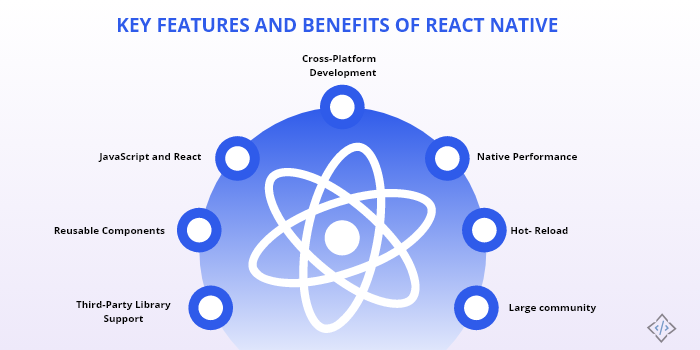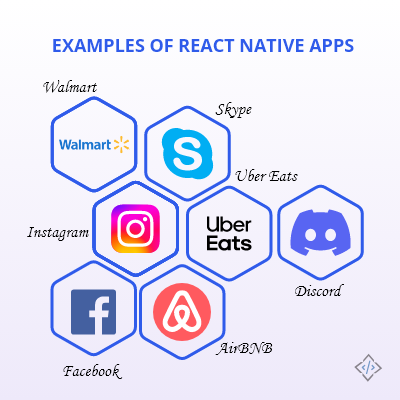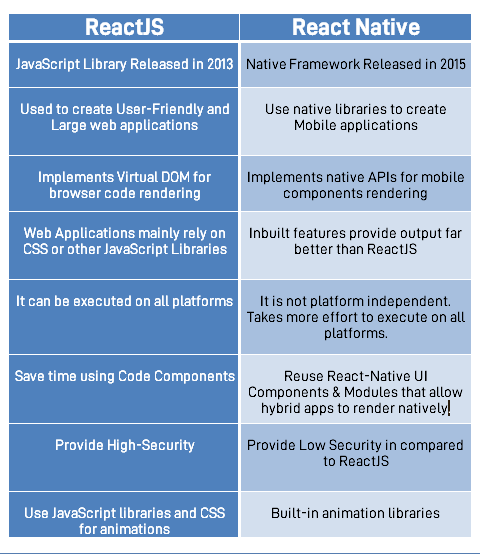
React Native: The Future of Mobile App Development
In today's rapidly evolving digital world, businesses need to keep up with the latest technology trends to remain competitive. Mobile apps have become a crucial part of business strategies, providing a convenient and accessible platform for customers to engage with brands and services.
However, the development of a mobile app from scratch can be a time-consuming and costly endeavor, especially if you need to create separate apps for different platforms like iOS and Android.
React Native, a JavaScript Framework developed by Facebook in 2015 offers solutions for this problem. It allows developers to create high-quality mobile apps that can run on iOS and Android platforms, using a single codebase. In this blog, we'll explore why React Native is the future of mobile app development for businesses, and how it can help you create efficient and cost-effective apps that reach a wider audience.
React Native App Development
React Native is a freely available framework that enables developers to create mobile applications utilizing JavaScript and React. It allows developers to create native iOS and Android applications using a single codebase. Also, it works by rendering components, which are reusable building blocks, to create the user interface.
In addition, React Native has rapidly become one of the most popular solutions for mobile app development within a short period. In addition, Instagram, Facebook, Skype, and several other leading mobile apps use this technology.
Key Features and Benefits of React Native

-
-
Cross-Platform Development
-
You can write code once and deploy it to both iOS and Android platforms, which can save time and resources.
-
-
Native Performance
-
The native code compiler of react native provides performance that is comparable to native apps. The use of native components instead of web-based features helps to contribute to improving app performance.
-
-
Hot- Reload
-
With the hot-reload feature, developers can see changes to their code in real-time without having to reload the entire application. This can significantly improve development speed and productivity.
-
-
Large community
-
With the large and active community of developers, plenty of resources, libraries, and tools are available to support development efforts.
-
-
JavaScript and React
-
Combination of popular technologies, JavaScript and React used in web development. This makes it easier for web developers to transition to mobile app development as they already leverage their skills and knowledge.
-
-
Reusable Components
-
Developers can create reusable UI components with react native that are used across different applications with component-based architecture. This reduces development time and improves maintainability.
-
-
Third-Party Library Support
-
Support third-party libraries with additional functionality and features. This makes it easier to integrate with existing systems, services, and APIs.
React native app development services offer a wide range of benefits for mobile app development, including cross-platform support, native performance, hot reloading, a large community, reusable components, and support for third-party libraries. These features can improve development speed, productivity, and quality while reducing development costs and effort.
Explore More: Top Mobile App Development Platforms for Your Next Project
Examples of React Native Apps
Several high-profile businesses have used React Native to create successful mobile apps, including

1. Facebook
The social media giant, Facebook has been using React Native in its mobile app since 2015. Facebook built its iOS and Android platforms using React Native, which makes it easier for them to maintain consistency in the user experience across both platforms.
2. Instagram
Another social media app owned by Facebook. Instagram, was built using React Native. The app was first launched in 2016 and has since then been using React Native for its Android and iOS versions.
3. Airbnb
The popular travel and accommodation booking platform, Airbnb, has been using React Native since 2016 to build its mobile app. Airbnb redesigned using React Native to ensure a seamless user experience on both Android and iOS platforms.
4. UberEATS
The food delivery service owned by Uber used React Native to build its mobile app. The app allows users to order food from restaurants and track their delivery in real-time.
5. Walmart
The retail giant, Walmart has been using React Native to build its mobile app since 2018. The app is available on both iOS and Android platforms and provides a seamless shopping experience to users.
6. Skype
The popular communication app, Skype, used React Native to build its mobile app. The developers redesigned the app using React Native to ensure better performance and a consistent user experience across both iOS and Android platforms.
7. Discord
The voice and text chat app popular among gamers, Discord has been using React Native to build its mobile app. The app was first launched in 2017 and has since then been using React Native for both iOS and Android versions.
Key Steps to Get Started With React Native for Business
React Native is an excellent tool for businesses that want to create efficient and high-quality mobile apps. However, getting started with React Native for business requires a bit of preparation and a deep understanding of its fundamentals. To get started with React Native mobile app development, follow the steps given below.
→ Set Up of Development Environment
The first step in getting started with React Native for business is setting up the development environment. You'll need to install the necessary software and tools to develop React Native apps, including
-
Node.js: Node.js is a JavaScript runtime that allows you to run JavaScript on the server side. To run React Native, you must download it from the Node.js website.
-
React Native CLI: The React Native CLI is a command-line interface that allows you to create and manage React Native projects. You can install it by running the following command in the terminal: ‘npm install -g react-native-cli’.
→ Understand React Native Basics
Before starting development, it's essential to understand the basics of React Native. React Native uses a combination of JavaScript and native components to create mobile apps. The app logic is written using JavaScript, while its appearance and behavior are handled by native components. You'll also need to have a good understanding of React and JSX, which are the core concepts used in React Native.
→ Libraries and Components
There are several libraries and components available for React Native, but not all of them are created equal. It's important to choose the right ones that can make a big difference in app performance and user experience. Some popular React Native libraries include:
-
React Navigation: React Navigation is a commonly used library that facilitates the development of navigation functionality within React Native applications.
-
Redux: Redux is a reliable and predictable state container that developers use for JavaScript applications, and it is a popular choice for managing application states within React Native apps.
-
Axios: Axios is a popular library for making HTTP requests in React Native apps.
→ Integration with Existing System
React Native can be easily integrated with existing business systems like databases, APIs, and third-party services. Integrating with existing systems can save time and effort, as you won't have to build everything from scratch. Some popular tools for integrating with existing systems include Firebase and GraphQL.
Start developing efficient and high-quality mobile apps for business using React Native. However, it's important to remember that React Native development requires ongoing learning and improvement. Staying up-to-date with the latest React Native trends, libraries, and best practices can help you stay ahead in today's competitive market.
How to Develop High-Quality and Efficient React Native Mobile Applications
React Native is a powerful framework for building efficient, high-quality mobile apps for businesses. However, like any development project, there are certain best practices that developers should follow to ensure success. Here are some best practices for developing high-quality and efficient React Native mobile apps.
Follow UI/UX design guidelines
User interface (UI) and user experience (UX) are crucial aspects of any mobile app. Follow the design guidelines to create a consistent and intuitive user experience that meets the needs of your target audience. There are design guidelines available for both iOS and Android platforms, and adhering to them will help ensure a seamless user experience across devices.
Use reusable components
With React Native, you can create reusable components that enable you to use them across multiple screens and even in different apps. This can save you significant time and effort in development, as you won't have to build everything from scratch. It also makes it easier to maintain consistency across your app.
Keep code clean and maintainable
Maintaining clean and maintainable code is crucial for any development project. It can help ensure that your code is easily readable and scalable, making it easier to maintain over time. Use a consistent coding style, write clean code, and document your code to make it easier for other developers to understand and work with.
Test, test, and test again
Testing is an essential aspect of any development project, and React Native is no exception. Use testing frameworks like Jest to test your app's functionality and ensure that it works as intended. It's also important to test your app on different devices and platforms to ensure that it works across different configurations.
Optimize performance
Mobile app performance is a critical factor in user experience. Use tools like React Native Performance to identify performance issues and optimize your app's performance. Avoid using heavy libraries and components that can slow down your app, and optimize images and assets to reduce load times.
By following these best practices, you can develop efficient, high-quality React Native business apps that meet the needs of your target audience. It is also important to stay updated on the latest React Native libraries, trends, and best practices to remain competitive in the rapidly evolving mobile app market.
Difference Between React Native and ReactJS
There are several differences between ReactJS and React Native when building user interfaces.

Why Choose CodeTrade for Custom React Native App Development Services?
The future of React Native includes not just mobile applications, but also enterprise-grade solutions. The new era of react native is expected to enter with exciting releases like Fabric. It appears a bright future for React native mobile application development.
At CodeTrade, we specialize in React Native app development Framework, one of the most popular frameworks for building mobile applications. We, as a leading React Native app development company in India, commit ourselves to providing the highest standards in app development, interface, and user experience.
We strive to deliver solutions that engage your users and give you complete control over your app with access to the source code. Our skilled team of React Native developer works tirelessly to ensure that your unique business needs are met with top-quality solutions.
By choosing CodeTrade for your next React Native app development project, you can trust that you will receive the best possible service and expertise to help your business succeed. Get in touch with us today to discuss and develop your next-gen mobile application with the React Native app development framework.